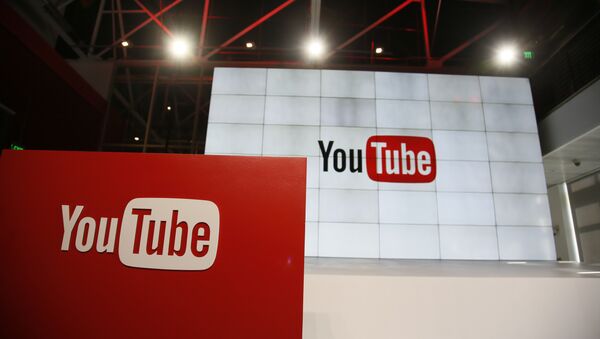Shane Huntley from Google Security’s Threat Analysis Group wrote on the company’s blog Thursday that they had disabled scores of YouTube channels in an effort to “combat coordinated influence operations.”
“This discovery was consistent with recent observations and actions related to China announced by Facebook and Twitter,” Huntley wrote.
Facebook and Twitter announced Monday the banning of hundreds of thousands of accounts on their platforms for what Twitter described as “deliberately and specifically attempting to sow political discord in Hong Kong, including undermining the legitimacy and political positions of the protest movement on the ground.”
Twitter deleted roughly 200,000 accounts, and Facebook removed seven pages, three groups and five private accounts.
Similarly to Twitter, Google noted that the use of “VPNs [virtual private networks] and other methods to disguise the origin of these accounts” was damning proof, alongside “other activity commonly associated with coordinated influence operations,” that the accounts were being directed from mainland China.
While China blocks access to sites like Twitter in most places, VPNs can be used to get around the firewall. However, VPNs can be used by anyone for any number of mundane purposes, including protecting one’s computer from hacking while using public Wi-Fi or torrenting files, accessing home or business networks while not on-location and simply protecting one’s anonymity online, according to How-to-Geek.
How any of the companies proved the activities of the account owners were inauthentic or coordinated is not stated, only that by posting material critical of the Hong Kong protests, they were engaging in disinformation.
Inevitably, when the US targets a country for standing up to it, we're bombarded with stories of evil deeds to justify US action against them. This is not propaganda, to them, it's simply "facts."
— Morgan Artyukhina (@LavenderNRed) August 20, 2019
However, try to counteract the massive MSM infowar - that's disinformation.
Curiously, none of the three companies has removed or censured any channel, account or page carrying pro-demonstration material from outside the semi-autonomous city.
The unrest in Hong Kong began in June, when the city government was weighing an extradition bill that would provide for the legal removal of some persons accused of crimes outside the city but who had fled there, provoked by the 2018 murder of Hongkonger Poon Hiu Wing, who was pregnant with child, in Taipei, Taiwan, and the city’s inability to extradite her boyfriend, Chan Tong Kai, to be tried for her death.
Hongkongers feared the bill would provide a mechanism for people wanted for political crimes in mainland China to be extradited, although the Special Autonomous Region’s government denied this was part of the agreement. Millions poured into the streets, and the clashes between police and protesters soon turned violent, with demonstrators attacking police stations and setting them on fire, as well as rallying around a kind of Hong Kong nationalism that celebrated the city’s 157-year period as a British colony that ended in 1997, when London returned the city to Beijing.
Beijing has accused Washington of supporting and encouraging the protests, especially as they take a decidedly anti-PRC stance. Significant evidence exists to support this, including a damning photo of a US diplomat meeting with protest leaders and admissions by US officials who played a role in planting the seeds of the unrest.
As a result, US-based social media companies denouncing activities ostensibly aimed at influencing Hongkongers seems a bit hypocritical.
Taking down social media accounts that give voice to political positions critical of, or counter to, the geopolitical goals of Washington elites has practically become a pastime of companies like Twitter and Facebook. The two have repeatedly removed thousands of user accounts under suspicion of being “engaged in inauthentic behavior and misrepresentation,” of which the primary proof is them being based in countries presently under the gun of the US empire or having shared news stories from media outlets associated with those countries, such as TeleSUR, PressTV and even Sputnik.
We need to stop pretending FB & Twitter aren't arms of the US state. For over a year they've deleted accounts of Iranians, Venezuelans, Russians, & Chinese simply for daring to voice opinions different from the imperialist narrative, under the aegis of combating "disinformation." pic.twitter.com/bML58Ufpe0
— Morgan Artyukhina (@LavenderNRed) August 20, 2019
Of course, Google is far from innocent of massive political manipulation of its users, either. Research psychologist Robert Epstein, of the American Institute for Behavioral Research and Technology, has documented the incredible power Google holds over the worldviews of people who search the internet using their website, being capable of shifting “upwards of 12 million votes with no one knowing they’re doing so.”
"Google's search algorithm can easily shift the voting preferences of undecided voters by 20 percent or more - up to 80 percent in some demographic groups - with virtually no one knowing they are being manipulated," Epstein wrote in a 2015 article for Politico. Subsequent research by Epstein on the US 2016 presidential election shows that searches consistently put Democratic presidential candidate Hillary Clinton higher in search results than her competitors.
Further, Google internal documents leaked to The Daily Caller this past April proved that it’s not just man-made algorithms that govern search result placement, it’s manually-pruned lists, too - something Google previously denied was the case.
Now, Hawaii Rep. Tulsi Gabbard, who seeks the Democratic Party’s presidential nomination for the 2020 election, is suing Google for its “arbitrary and capricious decision” to briefly suspend her campaign’s advertising account, affecting her fundraising efforts during a key period following the first debate in late June.


